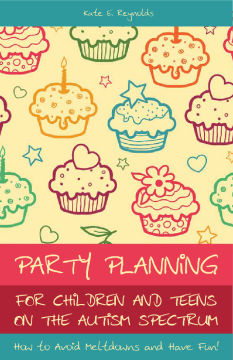
Additional Information
Book Details
Abstract
Parties and celebrations can be highly challenging for children and teens on the autism spectrum and they can often feel reluctant to participate. This book shows that if parties embrace the differences intrinsic to autism, and are planned carefully, they can be inclusive events enjoyed by all.
Drawing on personal experience with her son, the author highlights aspects of conventional parties that can heighten the anxieties of those on the spectrum and outlines practical solutions to these issues. The book covers considerations for party invitations, prizes, food and venues and includes chapters suggesting activities for age groups 2-8, 9-12 and teenagers.
This book will empower parents and caregivers to plan stress-free parties with ease, enabling those on the autism spectrum to develop social skills and self-confidence – and most importantly, have fun!
Kate E. Reynolds worked for 18 years in various locations in the UK for the National Health Service, and worked in HIV/Aids and sexual health for 7 years with the NHS as a Clinical Nurse Specialist and Senior Counsellor, which involved training other staff. Her son was diagnosed with severe autism disorder in 2005 and she is passionate about supporting parents and caregivers with practical information about autism spectrum disorders. She has returned to the University of Bristol to do her MSc in Disability Studies, with a view to extending her original research in future. Kate lives in Wiltshire, UK, with her two children, Francesca and Jude.
I really liked the fact that the book was broken down from children to teens and higher and low functioning, giving different ideas for both, from simpler formats with not many activities, to more complex ones.
Netbuddy.co.uk
Giving or attending parties with a child on the autistic spectrum can be immensely challenging, and what should be fun for both of you can end up in distress and chaos. This practical book is full of sensible and useful advice for anticipating every problem and negotiating the way around it, written by one who knows exactly what she's talking about - a mum, of course.
Jane Asher, President of the National Autistic Society
This book is about how to get the best "party" deal for your autistic child/children and the best "party" future. The author recognises that social events like parties can often expose an autistic child in a cruel and harmful way, and her aim is to mitigate any damage in this respect... Reynolds understands from a 'in your shoes' perspective, which is a position which gains much respect in the autism community... she shares her best tips and practice.
Action for Asperger's
It's great to have a "checklist" style guide to planning and attending parties for kids on the autism spectrum. As a mom who, without much forethought, invited a whole class full of autistic kids over for a fun afternoon, I can say that a little pre-planning can go a long way. Especially helpful are the specific recommendations for menus, activities and pre-planning. Bounce houses, trampolines, swimming pools and soft play centres are all ideal for non-competitive, low-stress venues for kids who enjoy sensory experiences but may have a tough time with organized games or social activities.
Lisa Jo Rudy, author of Get out, Explore, and Have Fun! How Families of Children with Autism or Asperger Syndrome Can Get the Most out of Community Activities and writer for www.autismafter16.com and www.authenticinclusion.org
Reynolds book has good flow and structure throughout
'A former nurse and counselor, a mother of an autistic child, Reynolds knows first-hand the difficulties of attending social engagements with a youngster who is on the spectrum. Here she offers a concise and practical guide to important considerations for hosting or attending parties.... Not only will parents of autistic children find helpful suggestions for parties, but any family hosting a child with autism would do well to review Reynolds's work and see how they can best make appropriate accommodations. Recommended for all libraries.'
Library Journal
